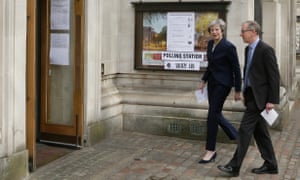Rafael Behr
 The pendulum is stuck. The traditional laws of political gravity predict a swing away from the party of national government in local elections, but it has been a while since British politics followed the obvious arc of precedent. If last night’s council election results conform to any pattern, it is the laudable habit that voters have acquired of giving party leaders cause to scratch their heads and wonder what the hell is going on. There is no big national winner. Since the Tories were braced for a mauling and escaped without one, Theresa May will be feeling relatively relaxed today. Labour needed to demonstrate that last year’s general election gains were a staging post on the road to national power; that destiny was calling Jeremy Corbyn. Destiny didn’t hang up the phone, but it has put the opposition on hold. Labour had ambitious targets – Tory bastions in London such as Westminster and Wandsworth – that did not fall.
The pendulum is stuck. The traditional laws of political gravity predict a swing away from the party of national government in local elections, but it has been a while since British politics followed the obvious arc of precedent. If last night’s council election results conform to any pattern, it is the laudable habit that voters have acquired of giving party leaders cause to scratch their heads and wonder what the hell is going on. There is no big national winner. Since the Tories were braced for a mauling and escaped without one, Theresa May will be feeling relatively relaxed today. Labour needed to demonstrate that last year’s general election gains were a staging post on the road to national power; that destiny was calling Jeremy Corbyn. Destiny didn’t hang up the phone, but it has put the opposition on hold. Labour had ambitious targets – Tory bastions in London such as Westminster and Wandsworth – that did not fall.
Money's tight – but Labour can still shine in local government
Outside the capital, Swindon and Nuneaton are the sort of places that would be swept up in Corbyn’s electoral slipstream if he were surging irresistibly towards Downing Street. But they resisted.
Labour still gained a bunch of seats. The defence of the opposition’s performance is that expectations of a Corbynite carnival in Tory heartlands had run out of control, partly because of the exuberance of the party’s activists and partly because many Westminster observers were over-correcting for their failure to anticipate the Conservatives’ dismal showing last June.
Not all of yesterday’s votes have been counted yet, but a provisional projection suggests that equivalent results, extrapolated as general election performances, would produce a House of Commons much like the current one. Parliament would still be hung. The biggest winners would be the Liberal Democrats, who would gain enough seats to make it back into the double-digit league.
That gives Vince Cable’s party their first taste of good news since they won the Richmond Park byelection in 2016. That was celebrated as “remainers’ revenge” against the Tories in an affluent, metropolitan suburb. The Tories took the seat back within a year. Now Richmond council has turned decisively Lib Dem. Brexit is certain to be a factor there, as it is in the wider national picture. At the very least, the fact of Britain loitering in the EU departure lounge has an obvious causal relationship with the collapse of Ukip, whose number one grievance has been bitten off and digested into the political mainstream. The party didn’t even field candidates in many seats it won the last time these councils were in play. The Tories appear to have benefited most from those vacancies.
Council ballots are often expressions of hyper-local issues, but the national context can’t be ignored. The government is attempting to pull off a vast, complex manoeuvre to reorient the entire country. Yet it still isn’t clear on what axis we are turning. The referendum battle was a messy combination of economic argument and culture war, neither of which has yet been settled. That is hardly surprising since Britain is still in an awkward limbo between the decision to leave (easily said) and safe exit (not so easily done). There is consensus between the two main English parties that Brexit is something that must be done, yet no agreement anywhere in the land on what that practically requires.

Guardian Today: the headlines, the analysis, the debate - sent direct to you
It isn’t even possible to get a cabinet subcommittee to agree on a choice between two fractionally dissimilar variants of an alternative to the customs union. And that is just one part of the enormous apparatus of EU membership yet to be dismantled (and, in all likelihood, reassembled to roughly the same specifications). None of the big questions raised by Brexit – about the UK’s role in the world, its economic security, whether or not it is in cultural retreat from tolerance to outsiders – has an answer.
The contours of those debates don’t map neatly on to the borough boundaries over which Labour and Tory troops did battle in rigid tribal formation. So even if Brexit wasn’t uppermost in many voters’ minds, it sat like a blustery, unsettled weather front over the whole political field, its unpredictable currents blowing gusts in multiple directions, helping some candidates and hindering others, but with no simple tailwind behind the biggest opposition party. The conditions were not conducive to easy swings of a pendulum.
No comments:
Post a Comment